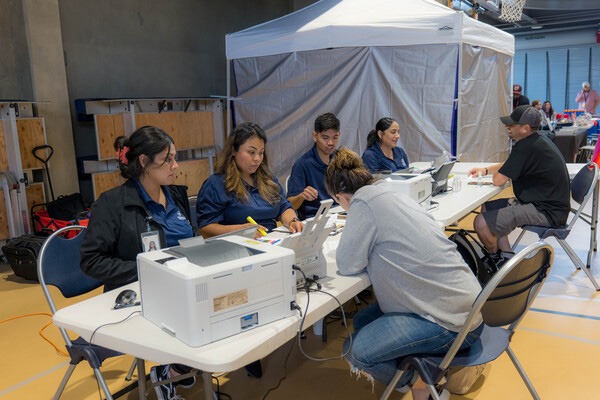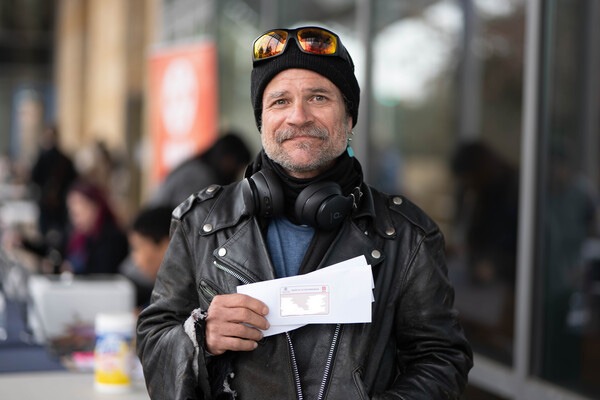Central Health’s Work Helps Unhoused Residents Achieve Better Health As They Move Out of Homelessness
February 5, 2025
The health crisis of homelessness
For thousands of people living in shelters or on the streets of Travis County, poor health is both a cause and a consequence of their lack of stable housing. “We understand that homelessness is not just a housing issue; it’s a health care crisis,” said Central Health President and CEO Dr. Patrick Lee. “People experiencing homelessness face severe health challenges that are often worsened by systemic inequities.”
Data from the End Community Homelessness Coalition (ECHO) underscores this reality. In 2023, more than 60% of the 24,348 people it served were living with at least one disabling condition. This includes both single adults and heads of households. These conditions range from mental health challenges and substance use disorders to chronic illnesses like diabetes, heart disease, or kidney disease.
Though the percentage of people with disabling conditions has declined from a peak of 71 percent in 2021, the overall number of people in ECHO’s Homelessness Response System has increased.

Rising deaths among unhoused people
Yet more troubling is the also-increasing number of people who are dying while unhoused. Earlier this year, ECHO released the community’s first Unhoused Mortality Report, revealing that 1,010 people died while experiencing homelessness between 2018 and 2023. Alarmingly, nearly a third of those who died (331 people) had no record of ever interacting with the homelessness response system.

The death rate during that time more than tripled—from seven deaths a month in 2018 to 22 monthly deaths in 2023. The average age of death was 50 years old. The most frequent causes of death included:
- Overdose (primarily methamphetamine, rather than opioids)
- Transportation accidents involving both cars and trains
- Cardiovascular disease
Because homelessness is so damaging to health, ECHO is updating its assessment tool to categorize people over 50 as “advanced age,” which can increase their chances of being placed in stable housing.
Addressing gaps in care
As Travis County’s hospital district and the linchpin of the safety-net health care system, Central Health has a front-line role in creating change and securing better health outcomes for the unhoused. Alongside CommUnityCare, the Central Health system’s network of community health centers, and Integral Care, the county’s mental health authority, Central Health has launched and enhanced services that are making a difference, including:
- Medical respite, which provides a safe, short-term residential setting for people without stable housing to recover from injury, illness, or surgery instead of being discharged from the hospital to the street.
- The bridge program, which offers treatment and support services that help patients maintain continuity of care and have both their medical and non-medical needs met more effectively than in an emergency room.
- Ongoing expansion of mental health care and addiction medicine, including medication-assisted treatment for opioid use and 24-hour staffing of Integral Care’s psychiatric emergency services unit.
- Continued focus on enrolling unhoused patients in the Central Health Medical Access Program (MAP), which covers services and transportation costs, and waives all copays for patients without housing.

Housing for Health: A Path Forward

While the number of permanent supportive housing (PSH) units in Austin and Travis County has grown, many PSH providers lack the resources to manage the often-complex medical needs of their residents. To address this issue, ECHO and the Dell Medical School at The University of Texas began planning the PSH Health Care Collaborative in 2023. The initiative brings together PSH providers such as Foundation Communities and Caritas of Austin with health agencies, including Central Health and its CommUnityCare Health Centers, and Integral Care.
To build on these efforts, last summer, Dr. Lee and Central Health introduced a “Housing for Health” planning concept. This initiative charts a 12-month path to help unhoused individuals transition from front-line services such as medical respite to stable housing while staying engaged in their own health care. This approach prioritizes both medical treatment and non-medical supports such as food security, transportation and case management.
A commitment to equity and action
Central Health’s work takes place in the context of persistent health disparities and inequities that burden Travis County residents with low income, whether housed or not.
“Medically vulnerable and unsheltered people are disproportionately people of color. Almost 60 years ago, Dr. Martin Luther King Jr. called injustice in health care the most shocking and inhumane, because it so often leads to death,” Dr. Lee said. “Health and housing are intrinsically linked, which is why our care extends beyond the clinical setting. We’re part of the continuum of care to address health, housing, and long-term support to break the cycle of homelessness. We’re staying connected with our bridge and respite care patients to keep them engaged in their health and help them transition into housing. This is part of our mission to improve the health of our community by caring for those who need us most. And this population is one of those that needs us most.”
